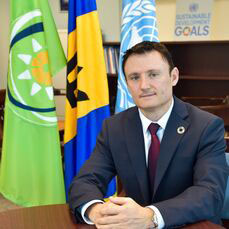Already having dealt a devastating blow to the tourism and service sectors across the region, adversely impacting the mainly small and open economies, the impact of the coronavirus has left the countries of the Caribbean “staggering”, according to United Nations Resident Coordinator for Barbados and the Eastern Caribbean, Didier Trebucq.
And while Trebucq says that the UN is working closely with the region in this crisis period, he asserts that it is becoming increasingly evident that a multi-sectorial response is required to meet, particularly, “immediate emergency health care and response needs, while ensuring that a social safety net is created to support people whose income may drastically reduce… and to protect the rights of the most vulnerable citizens.” This multi-faceted approach would seek to mitigate shocks and support recovery efforts from a crisis that may exacerbate existing inequalities and result in losing past years’ gains towards the achievement of Sustainable Development Goals (SDGs).
According to Trebucq, “the imminent threat to over-burdened healthcare systems and fragile economies” are among the most immediate concerns facing Caribbean governments. This, he says, has the capacity to spark widespread unemployment and erode social gains. The UN official fears that the twin burdens of meeting immediate emergency health care and response needs while ensuring that a social safety net is created to support people whose income may drastically reduce during this crisis and to protect the rights of the most vulnerable citizens could stretch the resources of the respective Caribbean territories to the limit. This, against the backdrop of a Pan American Health Organization (PAHO) report that the number of COVID-19 cases in the Americas region is rising steadily.
“As the Caribbean embarks on response and recovery efforts, the principles of leaving no one behind, non-discrimination, and commitment to universal access to essential services would be a useful basis for effective health-related, social and economic stimulus recovery policies,” the UN official says.
Advocating what he describes as a “targeted human rights-based approach” in countries’ responses, Trebucq asserts that in the region, high priority should be given to “the interests of the elderly, women and girls, children, people with disabilities, migrants, persons in detention, the homeless and other marginalised and displaced groups,” whom he says, are “the most vulnerable.”
The elderly, the UN official said, are being disproportionately affected by the coronavirus as evidenced by the high number of deaths in this population group. He noted as well that in the Caribbean, “women are the primary caregivers in many households, and comprise approximately 70 per cent of vital roles in the health and social sectors. Consequently, women not only bear a greater social burden, but face an increased risk of exposure as frontline workers in any crisis… For this reason, it is important that health and social services are targeted to address their needs, especially those isolated without family support system.”
And the UN official is also advocating what he described as “gender sensitive strategies and interventions in support of potential victims” as a necessary tool to prevent the exacerbation of gender inequalities.
Containment measures intended to suppress the spread of COVID-19, such as self-isolation and physical distancing, may result in victims being confined with their abuser with little access to support services. Gender-sensitive strategies and interventions in support of potential victims are a necessary tool to prevent the exacerbation of gender inequalities… Previous humanitarian crises have also shown children to be increasingly vulnerable to mistreatment, violence, and exploitation,” he added.






